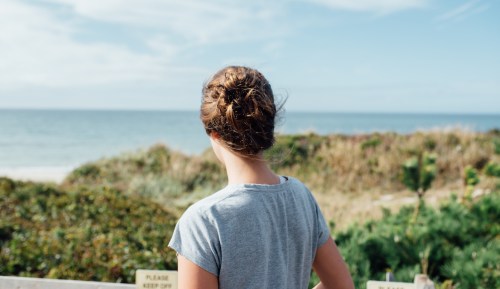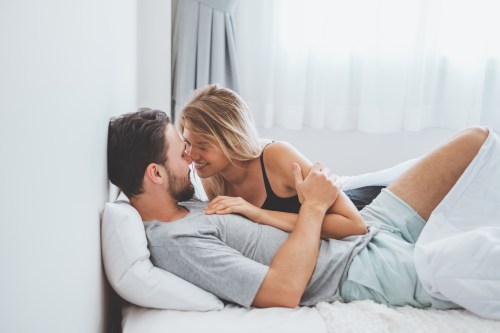
If Everyone Would Just Listen to Jameela Jamil, the World Would Be Better
Two weeks before I log on to Zoom to chat with actress and activist Jameela Jamil, much of Hollywood’s A-list walked the red carpet at the Met Gala. Hosted by American Vogue editor in chief Anna Wintour, this annual event is a fundraiser for New York City’s Metropolitan Museum of Art, but is better known as “fashion’s biggest night out.” It’s an opportunity for celebrities to don couture, rub shoulders with one another, and make headlines with their statement-making ensembles.
Jamil didn’t attend the event, but that doesn’t mean she didn’t make headlines in the next day’s news.
You see,the 2023 fete was in celebration of the fashion designer Karl Lagerfeld, a man who famously made many racist, sexist, and fatphobic comments over the course of his career, before his death in 2019. I won't detail what Lagerfeld said or did (if you want those details, there are plenty of places for you to find them) because this isn’t a story about Lagerfeld and his views. This is about Jamil’s perspective.
Fast-forward to mid-May, when I had the pleasure of speaking with Jamil for the better part of an hour. I had to ask her: Does a fear of backlash, of knowing that opinions strongly held will surely find their way into the news cycle, ever dissuade her from speaking out? “Backlash is inevitable if you're a woman with any opinion on anything whatsoever. So that's not something I worry about,” she says. “I know that that's coming. And the day-to-day gamble is, ‘Is this worth it?’"
Several personal values help Jamil answer that question: “Telling the truth is incredibly important to me,” she says. “Justice and being fair is very important to me. And while I am on my own journey of making myself a better person, I'm also just trying to make sure that we're all keeping ourselves in check."
Jamil created the Instagram account I Weigh (which now has 1.2 million followers) in 2018; a platform and podcast by the same name now galvanize a community around the idea of “radical inclusivity.” Combatting the toxic body and beauty standards imposed by diet culture has been core to I Weigh’s mission from the beginning. Now, Jamil seeks for the brand to “mobilize activism” around issues of discrimination, mental health, climate change, and more. “Our job is to amplify, advocate, and pass the mic,” I Weigh’s Instagram bio reads.
“Is it worth it?” Jamil tells me she asks herself before speaking out on a topic. When your words have the power to change minds and lives, the answer is almost always yes.
“As consumers, as a society at large, we have to remember that we are in power,” Jamil says. “The multi-billions of dollars in the diet industry comes from our pockets. We work hard all day for the money that their pockets are lined with. We can actually choose which magazines we buy. We can choose who we follow online. We can choose who becomes a celebrity and who doesn't…There is a democracy to all of this, and we forget that. We feel as though we have no choice but to go along with it.”
And so now, let me take a cue from I Weigh and pass the mic to Jamil. She has a few things to say, and you’d be wise to listen.
With Well+Good’s Bodies Issue, we're challenging the assumptions that people make about what a healthy body looks like or is capable of; we want to acknowledge and celebrate all the different complex feelings that people have about their bodies. So I'd love to start there. When you hear the term “healthy” or “healthy body,” what does that conjure for you? And what do you think are some of the stereotypes that need dispelling?
So much of these stereotypes or misconceptions that people have about what healthy looks like is informed by diet culture. I think many of us, especially women of a particular age, have been impacted by the images and stories we've been fed our whole lives. What do you think are some of the most pressing things that diet culture has taught us that we most need to unlearn?
JJ: I think it always starts with the fact that your value is in how little space, as a woman, you take up and how much space in the right way, as a man, you should take up. I think it's this idea that our value lies in a number on a scale, and that's so preposterous.
I also think that you are commended for, quote, unquote, "discipline" in diet culture, which often revolves around starving yourself and leading yourself towards malnutrition and an impacted bone density, kidney dysfunction…There's really no nuance to the diet industry. You are taught that as long as you look a certain size, that can qualify you as healthy, and you will be deemed a valuable and acceptable member of society.
It's really scary and sad to watch because I'm on the other side of a 20-year battle with anorexia, and I can specifically link most of my most pressing and long-term health problems to that anorexia, to everything I did to maintain a body that I would not be judged for having. I've risked my life. I've damaged my life. I've almost certainly shortened my life because of everything that I did.
And that's why I fight so hard to make people aware of the problems with a quick-fix diet. There's no such thing as a quick-fix lifestyle change, because your body is not built to adapt to speed changes. So whether you're trying to get bigger or smaller, you have to do these things slowly, gradually, sustainably, and with the guidance of a medical professional.
With your experience with anorexia in mind—or not!—I'm curious: How would you characterize your relationship with your body today?
JJ: I'm in a really good place with my body now. It took a really long time to get there, and I did a lot of EMDR, which is eye movement desensitization and reprocessing therapy, to kind of reestablish my relationship with food and to try to work on body dysmorphia. I really didn't think my body dysmorphia was ever going to go away but, I don't know what's happened in the last year, and maybe it's the return of heroin chic, but it seems to have broken my brain in a way that has finally woken me up from this terrifying nightmare that I've been in since I was 11 years old. There's the déjà vu of seeing that body standard come back in at any cost…and it seems to have cracked me, and I think I actually have gotten to a place of sanity.
It might be the best thing that's ever happened to me, personally, because I look in the mirror and now can see my body, I think for the first time, as it is. And I don't look at it with love and I don't look at it with hatred. I've been practicing the act of body neutrality for a really long time, which means not really focusing on my body at all, trying to not have an opinion on it, just accepting it is there.
It is doing what it's going to do. I'm nourishing my body appropriately, and this is what it looks like when I nourish my body appropriately. It's getting me from A to B, and it took me to have sex last night and it's going to take me to the fridge and then it's going to take me to work later and it's going to take me to make all of my dreams come true and to take me to see my friends and have amazing experiences. And so, it's my car and I'm going to fuel my car appropriately…but I'm not going to judge the way that it looks. And I'm not going to hurt it in any way, because then it won't be able to take me around to make all of my dreams come true.
Sign Up for Our Daily Newsletter
Get all the latest in wellness, trends, food, fitness, beauty, and more delivered right to your inbox.
Got it, you've been added to our email list.





